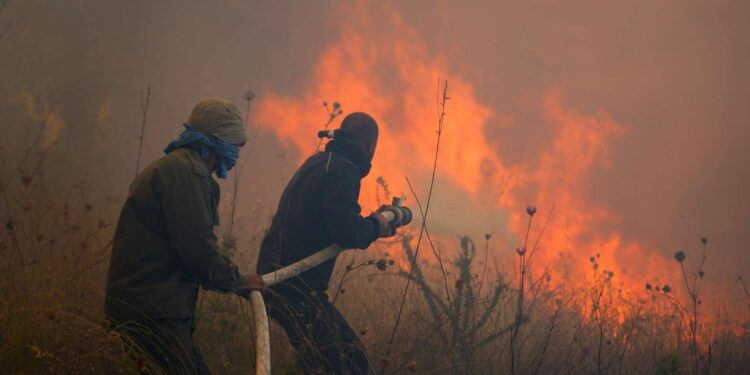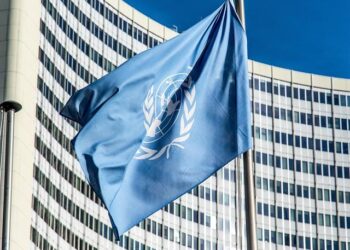Cyprus is grappling with a devastating wildfire that has claimed the lives of two individuals, prompting urgent international assistance to help contain the blaze. As firefighters from multiple countries join forces to battle the rapidly spreading flames, authorities are working around the clock to protect residents and natural landscapes from further damage. The unprecedented scale of the wildfire has underscored the growing challenges posed by extreme weather and climate conditions in the Eastern Mediterranean region.
Cyprus Receives International Assistance to Combat Devastating Wildfire
In a concerted effort to tackle the fierce wildfire that has tragically claimed two lives and ravaged vast areas of Cyprus, multiple nations have stepped forward with critical support. Firefighting teams, aircraft, and specialized equipment from countries across Europe and the Middle East have arrived on the island, bolstering local emergency response capabilities. The combined forces are employing aerial water drops, controlled backburns, and rapid-response ground units to contain the blaze, which continues to threaten residential areas and natural reserves.
Key components of the international aid include:
- Aerial firefighting planes and helicopters capable of large-scale water and fire retardant dispersal
- Specialist wildfire crews with advanced training in rugged terrain operations
- Emergency medical teams prepared for rescue and trauma care
- Logistical support ensuring supply chains for fuel, food, and essential equipment
The table below outlines the primary international partners and the types of aid provided:
| Country | Assistance Type | Units Deployed |
|---|---|---|
| Greece | Aerial Firefighting Aircraft | 3 planes, 4 helicopters |
| Israel | Wildfire Specialists & Equipment | 25 fire crews, 6 vehicles |
| Italy | Aerial Support & Logistics | 2 water bombers, supply trucks |
| France | Emergency Medical Teams | 15 paramedics, ambulances |
Impact of the Wildfire on Local Communities and Ecosystems
The devastating wildfire that has swept through Cyprus has left an indelible mark on both the local communities and fragile ecosystems. Entire villages have faced evacuations, with residents displaced and critical infrastructure severely damaged. Emergency shelters are now housing hundreds of families, many of whom have lost homes and livelihoods. The psychological toll on these communities is mounting, as recovery efforts are compounded by fears of recurring fires during the dry season. Essential services such as schools and medical centers remain disrupted, impacting daily life and the region’s overall stability.
Ecologically, the wildfire has ravaged vast tracts of forest and wildlife habitats, threatening biodiversity that is crucial for the island’s environmental health. Conservation experts warn of long-term consequences, including soil erosion and loss of native species. Firefighters and environmental agencies are collaborating on restoration plans, including:
- Reforestation with native plants to prevent desertification
- Wildlife rescue operations to safeguard endangered species
- Monitoring soil quality to mitigate post-fire degradation
- Community education programs on fire prevention and sustainable land management
| Impact Area | Effect | Immediate Action |
|---|---|---|
| Housing | 200+ homes destroyed | Temporary shelters established |
| Wildlife | Loss of habitat for native species | Rescue and relocation efforts |
| Forests | Over 15,000 hectares burned | Reforestation initiatives launched |
| Health | Increased respiratory illnesses | Medical aid and air quality monitoring |
Strategies and Recommendations for Enhancing Wildfire Preparedness and Response
To strengthen wildfire preparedness and response, it is vital that governments and local agencies prioritize community engagement and education. This includes launching awareness campaigns focused on evacuation protocols, fire-resistant landscaping, and early fire detection methods. Emergency drills tailored to vulnerable areas can significantly improve reaction times and minimize casualties during active wildfire events. Leveraging technology such as real-time satellite monitoring and AI-powered risk assessments also provides authorities with crucial data to allocate resources more effectively.
International collaboration plays a key role, as demonstrated by the recent assistance Cyprus received amid its devastating wildfire. Sharing resources and expertise ensures rapid deployment of firefighting units, while cross-border training programs can enhance skills in wildfire management. Below is a concise overview of essential strategies for improving wildfire readiness:
- Invest in advanced early warning systems and air quality monitors
- Develop clear evacuation routes with signage and public instructions
- Promote fire-resistant building materials in at-risk regions
- Strengthen coordination between national and international firefighting teams
- Allocate funding for ongoing wildfire research and community support initiatives
| Strategy | Impact | ||||||||
|---|---|---|---|---|---|---|---|---|---|
| Community Education Programs | Reduced civilian casualties and quicker evacuations | ||||||||
| International Support Networks | Increased firefighting capacity during peak crisis | ||||||||
| Advanced Monitoring Technology |
If you want, I can also help summarize the information or generate additional content related to wildfire preparedness. Just let me know! Closing RemarksAs Cyprus continues to grapple with the devastating wildfire that has claimed two lives, international assistance remains crucial in combating the blaze and preventing further loss. The collaboration between Cyprus and its global partners underscores the importance of solidarity in the face of increasingly severe natural disasters. Authorities urge residents to stay vigilant and adhere to safety measures as firefighting efforts persist. Updates will follow as the situation develops. ADVERTISEMENT |
















